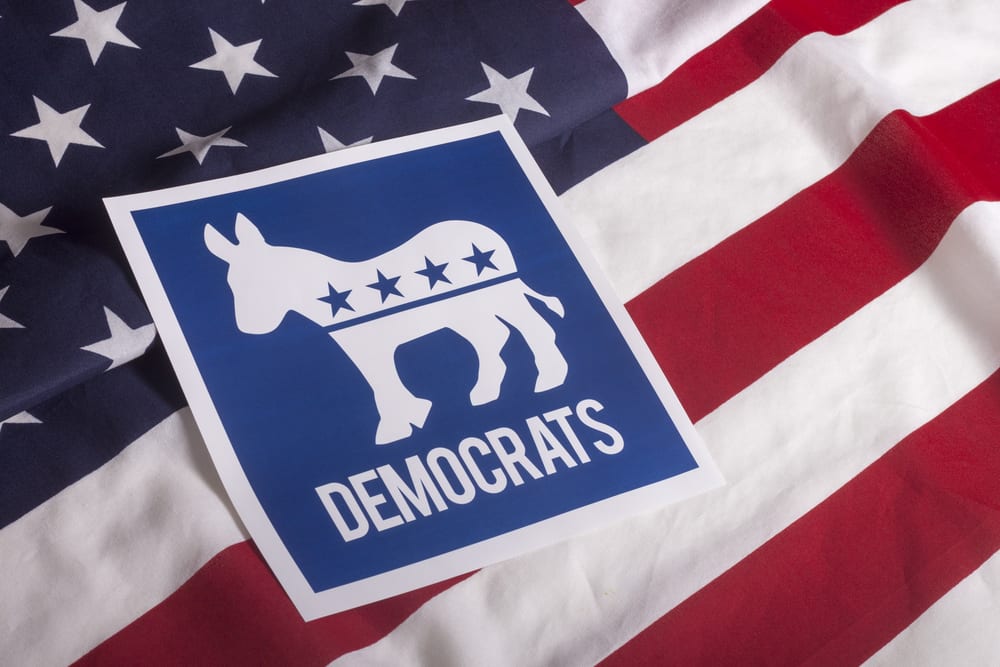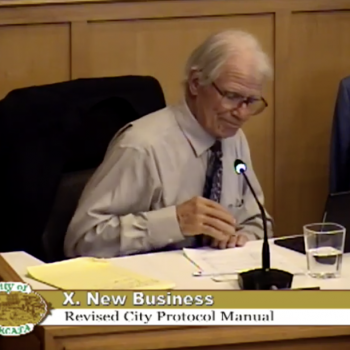The Democratic National Committee passed a resolution over the weekend acknowledging the “value, ethical soundness, and importance” of non-religious Americans. (This occurred at the same meeting where the DNC rejected a resolution supporting single-issue debates, like one about climate change.)
According to the Secular Coalition for America, after the DNC’s Resolutions Committee first approved the document on Thursday, the vote was unanimous (except for one abstention). It’s the first time, the SCA says, that a major U.S. political party has “specifically courted religiously unaffiliated people across the nation.”

It couldn’t come at a better time. There’s been plenty of talk about whether Democratic presidential candidates are doing enough to win over people of faith. Some of them have already hired faith outreach directors with a specific goal of connecting the candidates’ policies with like-minded religious people.
But usually, politicians of all stripes prefer to distance themselves from non-religious Americans altogether. That’s true for Democrats as well, even though most of the ever-growing number of Secular Americans vote for them. But in 2020, Democrats will need all the votes they can get and they have plenty more to gain by embracing Secular Americans than worrying about who might complain if they do.
The resolution in question says this:
WHEREAS, the religiously unaffiliated demographic has tripled in the last two decades, now representing 25% of the overall American population and 35% of those under the age of 30; and
WHEREAS, religiously unaffiliated Americans overwhelmingly share the Democratic Party’s values, with 70% voting for Democrats in 2018, 80% supporting same-sex marriage, and 61% saying immigrants make American society stronger; and
WHEREAS, the religiously unaffiliated demographic represents the largest religious group within the Democratic Party, growing from 19% in 2007 to one in three today; and
WHEREAS, the nonreligious have often been subjected to unfair bias and exclusion in American society, particularly in the areas of politics and policymaking where assumptions of religiosity have long predominated; and
WHEREAS, those most loudly claiming that morals, values, and patriotism must be defined by their particular religious views have used those religious views, with misplaced claims of “religious liberty,” to justify public policy that has threatened the civil rights and liberties of many Americans, including but not limited to the LGBT community, women, and ethnic and religious/nonreligious minorities; and
WHEREAS, the Democratic Party is an inclusive organization that recognizes that morals, values, and patriotism are not unique to any particular religion, and are not necessarily reliant on having a religious worldview at all; and
WHEREAS, nonreligious Americans made up 17% of the electorate in 2018 and have the potential to deliver millions more votes for Democrats in 2020 with targeted outreach to further increase turnout of nonreligious voters; and
WHEREAS, a record number of openly nonreligious candidates are running for public office;
NOW, THEREFORE, BE IT RESOLVED, that the DEMOCRATIC NATIONAL COMMITTEE recognizes:
1. The value, ethical soundness, and importance of the religiously unaffiliated demographic, a group of Americans who contribute in innumerable ways to the arts, sciences, medicine, business, law, the military, their communities, the success of the Party and prosperity of the Nation; and
2. That religiously unaffiliated Americans are a group that, as much as any other, advocates for rational public policy based on sound science and universal humanistic values and should be represented, included, and heard by the Party.
This may seem like lip service to you, but keep in mind this is hardly an easy resolution to pass. It sets the party up for plenty of attacks by the Religious Right, who will inevitably paint this as some sort of attack on Christians — which is how they treat everything that doesn’t promote Christian Nationalism.
Still, it’s the least the Party could do, given that non-religious people are even represented in Congress — including within the Congressional Freethought Caucus — and state legislatures. We’re not just voters; we’re representatives. So stop pretending we don’t exist.
The SCA is thrilled with the resolution’s passage:
“America was founded as a secular government charged with representing and protecting the freedoms of people of all faiths and none — I am proud to see the Democratic Party take that to heart by bringing secular Americans into the fold,” said Sarah Levin, Director of Governmental Affairs for the Secular Coalition for America. “It is high time for nonreligious voters to have a voice in the party, as we already have a large and growing impact each year at the ballot box. Nonbelievers in America have long been unfairly treated as pariahs in the political arena — this first-of-a-kind step was long overdue and deeply merited as the religiously unaffiliated community continues to grow its share of the U.S. electorate.”
…
“We have seen record numbers of nonreligious candidates running for office,” said Ron Millar, coordinator of the Freethought Equality Fund PAC, which works to increase the number of open humanists and atheists in public office at all levels of government. “Hopefully, the DNC’s recognition of nonreligious voters will lead to more representation in elected offices, so that America’s lawmaking bodies more accurately reflect the growing number of nonbelievers in our great country.”
Again, this is a start. It’s an important move. But it must be the beginning of a longer relationship. The eventual presidential nominee must openly court non-religious Americans by talking about the importance of church/state separation, science, and reason-based policymaking. The party ought to invite Secular Americans to their convention, much as they do with religious leaders who represent a much smaller slice of the electorate.
They have nothing to lose by doing this — if they’re worried about optics, remember that Republicans are going to trash them no matter what they do, so it’s far better to just do the right thing.
***Update***: The Democratic Party of Massachusetts passed a similarly worded resolution in November, drafted by the American Humanist Association’s former legal director David Niose and Stuart Wamsley of the Greater Boston Humanists. It also passed with no objections.




It’s Moving Day for the Friendly ..."
It’s Moving Day for the Friendly ..."
It’s Moving Day for the Friendly ..."
It’s Moving Day for the Friendly ..."